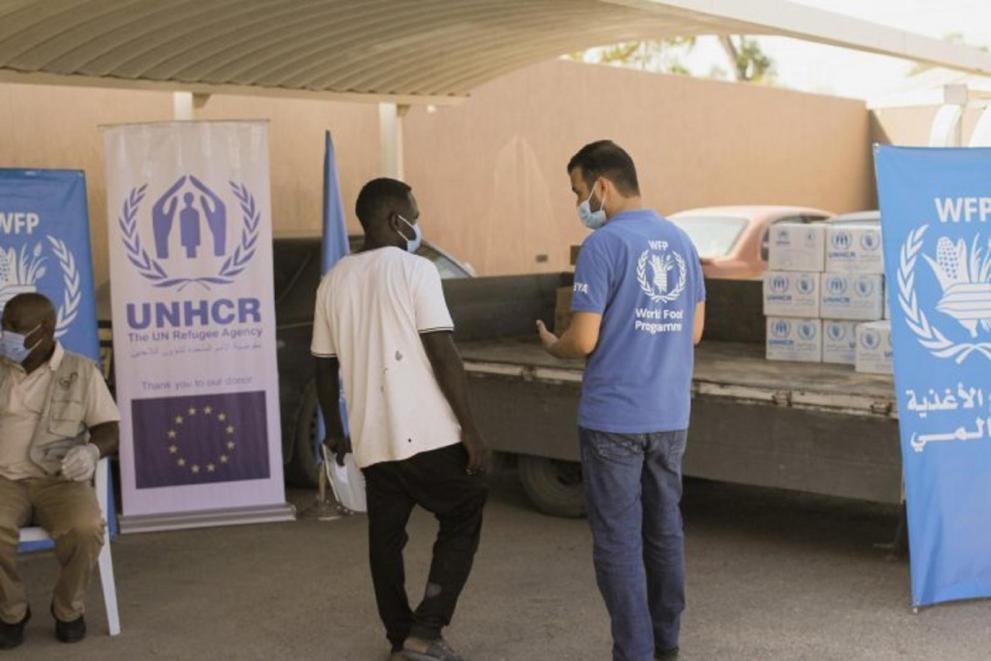
Covid-19 has aggravated the dire situation of refugees and asylum seekers in Libya. The EU supports the scaling up of food aid for thousands of refugees and asylum seekers in Tripoli, Zawiya, Misrata and Zwara in Libya.
UNHCR, the UN Refugee Agency, and the World Food Programme, WFP, are expanding their partnership supporting food insecure refugees and asylum seekers in Libya with emergency food aid this year. The expanded food distributions is supported by the North of Africa window of the EUTF Africa. An additional 6,000 refugees and asylum seekers will be reached in this second phase, with 10,000 people targeted with assistance through the end of this year.
Coronavirus infections have surged in the country, rising from 200 reported cases in June to close to 30,000. COVID-19 related movement restrictions and curfews have led to sharp increases in food prices, while making it hard for most refugees and asylum seekers to find daily work to support themselves.
According to the latest monthly market monitoring and assessment carried out for the inter-sector Libya Cash Working Group, led by UNHCR, the cost of a minimum expenditure food basket that would meet basic needs was 19.2% more expensive in August than in March, when the first Coronavirus cases were reported in Libya. Cooking fuel prices increased by 66.7% from July-August.
“A combination of factors contributes to an extremely dangerous situation, especially for already vulnerable populations in the country,” said Samer AbdelJaber, Country Director and Representative of WFP in Libya. “Just one of these is the increase in cooking fuel price due to the fuel shortage and the rise in food prices at the same time as there are next to no opportunities for work, stretching coping capacities to a maximum. At time like these, regular food support becomes even more of an imperative to meet this core need.”
Food needs in the new focus areas for support were verified through WFP quick needs assessments. Both agencies have reported increases in requests for food assistance over the past few months.
“The coronavirus pandemic affected our daily meals,” said Bashir, a twenty-nine-year old refugee from Sudan who came to Libya to work as a daily laborer. “There’s no work anymore, so there is no money. We have not been able to pay for food. Some days we take out one dinar to buy four bread loaves, just to fill our stomachs.”
Among those who will continue to be assisted under the project are refugees and asylum seekers recently released from detention centres. More than 20 individuals, including minors, were provided with assistance earlier this month after being released from Triq al Sikka detention centre.
“The help we provide under this project is lifesaving”, said UNHCR’s Chief of Mission, Jean-Paul Cavalieri. “Its especially crucial for those just released from detention, who struggle initially to support themselves in urban settings”.
The micronutrient-dense, ready-to-eat emergency food packages, providing enough food for one month, include hummus, canned beans, canned tuna, halawa, and date bars which cover 53 percent of the daily caloric requirement of a healthy person (around 1,100 kilocalories).
WFP and UNHCR staff, as well as their partners, will continue to ensure COVID-19 precautionary measures, such as personal protection equipment, social distancing, disinfection and enhanced crowd controls, are in place for the distributions.
EUTF support in Libya
The Trust Fund has mobilised so far €455 million in projects in Libya, out which over half for protection and assistance to migrants, refugees and internally displaced people.
Details
- Publication date
- 28 September 2020
